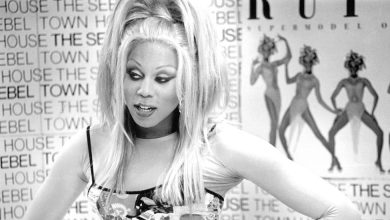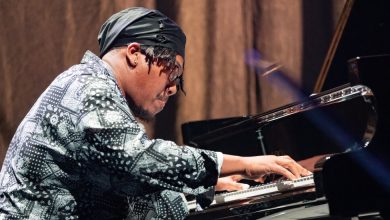A ‘Girl Singer’ and Her Extra Hair Hit the Road

Alone in a Florida hotel room, I reach around the back of my (rented) red lace minidress. I find the zipper but can’t pull it up all the way. The dress is on right, I can see it in the mirror, but it’s gaping open. I do what every “girl singer” — as Stephen Sondheim called our kind, whatever our age — has learned to do on such occasions: I step into the hotel hallway, listen for voices and hope for the zipper-kindness of a stranger.
Caught in the same fix in Indianapolis a few days earlier, I turned to two British men, each one about 30, still in wet bathing suits; one held the zipper and the other pulled. In Florida, I find a well-dressed couple in their 70s emerging from the elevator. I ask the lady to zip me in, trying to suggest professionalism rather than oddness. She does, and later that night they come down to hear the show. A double score for a wandering singer.
I stop to think about how many times in my life I’ve enacted this absurd little playlet. I’ve been on the road since the middle of February, and my calendar has me moving until the end of November, when, mirabile dictu, I will make my Carnegie Hall debut in concert, a sudden gift from the singers’ gods, who are crazy. I return home to New York intermittently, to switch gowns and change scripts.
After two years of pandemic mothering, I am once again the girl singer who packs her bag with the paraphernalia of her trade: a voice mister, Spanx, gowns, sheet music. This tour, canceled in 2020 and now rescheduled, was to be a memorial tribute to my mentor Michel Legrand. In the interim, my other musical master, Sondheim, has died, and so some venues and promoters quickly asked if I could change my shows to sing in his memory. I feel a little like a widow with two dead husbands to mourn.




In performance, clockwise from top left: at Crazy Coqs in London; in Carmel, Ind.; singing Stephen Sondheim with ukulele in Las Vegas; paying tribute to Michel Legrand in Erie, Penn.
There are other musicians out there, too, crisscrossing the country, living on the lower slopes and, yes, sometimes on the summits, of show business. We are the last wandering minstrels, racing town to town, big clubs and small, piano player to piano player. (I had nine this year.)
Here are some notes from that circus.
The first thing a traveling singer does is pack her bag and get to the airport. Sometimes you’re not sure which airport; I have a nice relationship with a guy at Delta J.F.K. who checks the calendar on my phone to make sure I’m boarding the right plane. (On three different trips, I have arrived, and he has asked me where I was headed — and I had forgotten.)
I travel light, but it sometimes becomes … heavy. For instance, I travel with my hair extensions in a shoe box. I carry them because, if they go in the checked bag, they will jostle around and end up looking tangled and ratty. So I carry the hair box, balanced flat like a cake on the top of my crammed wide handbag, overflowing with music, makeup, sleeping pills, a laptop, a spare scarf, a book on female adolescence (I have three teenage daughters at home), a fat diary called “Fire” by Anais Nin (always one erotic book to ease the days), two bottles of coconut water and my new voice mister, which makes me look like I am smoking a pipe. (“Mom, are you vaping?” the girls ask incredulously on FaceTime.) I have a black binder with my script in another tote, and I will read it over on the plane to be sure I am singing — and speaking — my memories of the right composer.
The flight has moved terminals, which is no surprise because, wherever I am, Terminal C is always changing to Terminal D, which can only be accessed by skybridge or the shuttle bus, which is downstairs to the left after the escalator and through baggage claim. Or you can take the Hovertrain which passes through Terminal A. But not today.
My one companion through all this is a ukulele, which I use in my Sondheim show. I have discovered that the mere presence of a ukulele mysteriously makes friends everywhere. I travel with it over my shoulder, and people smile at me and ask if it’s a violin. Security officers treat it carefully, as though it were a puppy.
I am not carrying luggage; I am carrying a system. Like a trunk, the big roller bag splits into two rectangular parts. I use half for my costumes, usually one beaded gown and some backups. Red. A basic black. Maybe one “risk dress” — something crocheted, or with strange lace, or patterned. I travel in a light wool coat and put a thin puffer vest in the suitcase in case my destination is really cold, with air conditioning you can’t turn off. I pack warm pajamas, to bundle up like a Slavic peasant at bedtime.

Along for the ride every time: an erotic book and a shoe box with hair extensions.Credit…Charity Rachelle for The New York Times
You never know what may happen, though. On my way to another Florida gig, this one in Fort Myers, I got to the gate with slightly too much carry-on luggage. I crammed items from a tote into the roller bag, and all that was left to carry on was my shoe box filled with hair. Once aboard, I rested the box on my aisle seat and went, briefly, to the bathroom.
When I left the toilet, I heard the pilot speaking on the intercom in a grand manner: “There is a brown shoe box causing concern. Does it belong to a passenger on board?” I immediately waved my arm. The whole plane turned around to look at me. I felt compelled to apologize to everyone: “It’s my hair!”
I was digging myself in deeper, so I actually opened the box and showed the hair to my fellow passengers. I explained that when I’m performing, I clip in some layers, and it puffs everything out kind of nicely and looks better, fuller, onstage. I had at least taken some sting out of the moment, popped this air balloon of pressure in a shoe-box bomb threat.
I judge my arrivals by not judging them. Sometimes I forget where I am. I sense the air as I get off the plane. A damp chill? A dry chill? A sudden mugginess? Early morning sun, dinner time, late night — where am I going next? An instant sense of hopefulness, tinged by desperation. Where is that itinerary, a little folded piece of paper somewhere in the bottom of my purse? Is this Palm Beach? Alabama? Maynard, Mass.?
Some hotels seem instantly comfortable, with a little flair, and others are hilariously retro, like the Garland in North Hollywood, Calif., named after Beverly Garland, a 1960s actress who wanted to create a hideaway for friends and family. Whimsical and bizarre, it has a fun lobby bar that serves the Beverly Garland martini. I loved being there, while fretting a bit about an actress’s legacy. I’m running out of time to leave my mark as a mixed drink.
After being bitten by a dog in L.A., I arrived at the Hotel Nikko in San Francisco, which turned out to be a dog hotel, “a haven for travelers and their canine companions.” With actual canines wandering the lobby and a puffy toy sheepdog on my bed, it was a condensed opportunity to do 60 hours of Cognitive Behavior Therapy, re-exposing me to my fears over and over. So San Francisco, my favorite place, was jumpy, but dreary Erie, Penn. — where my room overlooked the lake — turned out to be as pretty and light-filled as Venice.
I sang in a 2,500-seat auditorium in Burlington, Iowa. “Tomorrow, we have a rodeo here — bulls will be standing right where you are now,” a stage manager said to me. Las Vegas went amazingly well. From there I went immediately to Indianapolis — which was a triumph, I suppose, of another kind.
I found myself in a pretty hotel, herding listeners into the basement-level nightclub like a kindergarten teacher finding stray children to come to recess. I discovered that there was a rival gala upstairs called “Discovering Broadway,” and that Wynton Marsalis and the Lincoln Center Orchestra were playing the Palladium across the street at exactly the same time. Our audience was so small I almost didn’t want to go onstage, but my pianist Tedd Firth reminded me that we have to. We did, and we got that little crowd happy and on their feet.
Off to London. I rise at 6 a.m. to get to Newark Airport, then sit onboard for three hours before they announce we have to exit. The flight is delayed another nine.
I cross the ocean, sleep 90 minutes and make my way to the great jazz club Ronnie Scott’s to rehearse. The club’s artistic director, James Pearson, my next pianist, turns out to be a broad-shouldered man with some Dickensian foppishness and a radically unleashed presence on the piano. Ravel flows as easily as a Shearing-esque tight swing. That’s how it is: one-night-stands that wilt or explode but must be made to work onstage.
Asked to make videos for Instagram to promote the weeklong engagement, I consider that we traveling singers are among the last carnival barkers, barking for ourselves. I have absorbed the difficult fact that it’s hard to succeed in the real world unless I have succeeded in the unreal, the television, world. But tickets must be sold, one by one if necessary.
So I do 42 takes on my iPhone, positioning myself in front of a red phone booth to obscure the porn and escort postcards taped onto it. Then an Instagram post: “Hey London! Don’t miss the late show on Thursday! It’s late for a reason,” I write, having no idea what that reason might be.
But I figured that is what advertising is: Make something special out of the late show. Promise the world.
And then a sudden stop. Unimaginably and yet predictably, in the middle, right before Palm Springs, I come down with Covid. Having efficiently sent my daughters away to camp, while my husband was out on his own road, I find myself alone in our Bronxville home, which was undergoing a bathroom renovation. This caused a disturbance of rodents, and so I found myself with nothing but, as the song might go, me and the mice and the virus. After two weeks, I was back on the road.
There, as well, the pandemic is over and not over. Some pianists wear masks, and some don’t. Same with the bartenders. Musicians and tech people have all become brisker about interactions, communicating online and speaking quickly and efficiently in rehearsals.
And after a performance, there is a confusion about whether or not to greet the audience masked. Selfies and after-show photos are taken quickly, masks dropped for a better picture. By now, more than two years after it all began, we’d expected audiences to be Roaring Twenties ecstatic. Instead, they are apprehensive, careful — learning to be audiences again just as we are learning how to perform in a transformed world.
A last encounter, at the airport on my way from London, I see a woman about my age, maybe a little younger, being given a difficult time at security for having a Ziploc full of sinus sprays. I sensed at once that she was another traveling singer, and that the sprays were part of her regime.
She turned out to be Christiane Karg, a German operatic soprano, who had sung the Brahms Requiem at Royal Festival Hall the evening before. Though she was heading to Germany, and I returning to New York, we agreed we had time for coffee. We discussed the differences between our concerts — how she calls hers “recitals,” for one — and that she tells no jokes to her audience: “The Requiem needs no setup.” We traded notes about throat comforts, Ravel, how to protect the voice in childbirth. I promised I would fuss over her if she came to New York.
Then we went our ways, east and west, two traveling women, still spraying, still singing. One with a ukulele.
Melissa Errico will perform at 54 Below in New York, Aug. 4-6.





